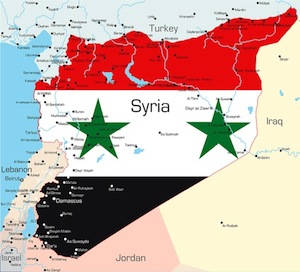 |
| Enlisted military and veterans hold the american
flag during the national anthem prior to the Los Angeles Dodgers'
baseball game (Credit: AP/Mark J. Terrill) |
Compulsory patriotism does nothing for soldiers who risk their lives -- but props up those who profit from war
My 16-month-old son was having a bad day. When he doesn’t sleep in the
car, he usually points and babbles his approval of all the wonderful
things babies notice that completely escape adult attention. On this
afternoon, though, he was teething and hungry, a lethal scenario for an
energetic youngster strapped into a high-tech seating apparatus
(approved and installed, of course, by the state).
When it became clear he couldn’t, or wouldn’t, sleep it out, my wife and
I stopped at a nondescript exit, the kind one finds every six miles in
the South, with two gas stations and three abandoned buildings (if
you’re lucky, you also get a Hampton Inn and Cracker Barrel). While she
tended to the baby, I entered a convenience store — one of those squat,
glass and plastic rectangles that looks like a Sears & Roebuck
erector set — praying it would have something other than beer,
cigarettes and beef jerky.
I settled on two Kraft mozzarella sticks, resisting the urge to purchase for myself a shiny red can of Four Loko.
"That’ll be $1.82," the lady at the counter cheerily informed me. After I
handed her two ones, she asked, "Would you like to donate your change
to the troops?" I noticed a jar with "support our troops" taped to it in
handwritten ink.
"No, thank you," I answered firmly.
"Well … OK, then, sir," she responded in subtle reproach, her smile not quite so ascendant anymore. "You have a good day now."
She had good reason to be disappointed. The vast majority of customers, I
imagine, spare a few dimes and pennies for so important a cause. Her
response evinced more shock than anger. She wasn’t expecting a refusal
of 18 cents, even from a guy who looks very much like those responsible
for the danger to our troops.
Besides, nobody likes to have their altruism invalidated by a recalcitrant or ungrateful audience.
I could have asked how the donations would be used, but no matter the
answer I would have kept my 18 cents. I don’t consider patriotism a
beneficent force, for it asks us to exhibit loyalty to nation-states
that never fully accommodate their entire populations. In recent years
I’ve grown fatigued of appeals on behalf of the troops, which intensify
in proportion to the belligerence or potential unpopularity of the
imperial adventure du jour.
In
addition to donating change to the troops, we are repeatedly impelled
to "support our troops" or to "thank our troops." God constantly blesses
them. Politicians exalt them. We are warned, "If you can’t stand behind
our troops, feel free to stand in front of them." One wonders if our
troops are the ass-kicking force of P.R. lore or an agglomeration of
oversensitive duds and beggars.
Such
troop worship is trite and tiresome, but that’s not its primary danger.
A nation that continuously publicizes appeals to "support our troops"
is explicitly asking its citizens not to think. It is the ideal slogan
for suppressing the practice of democracy, presented to us in the guise
of democratic preservation.
I
returned to the car, wondering if it will ever be possible to escape
the inveterate branding of war as a civic asset in the United States. My
son happily grabbed his snack and giggled as I jingled the change
before dropping it into the ashtray.
* * *
The
troops are now everywhere. They occupy bases and war zones throughout
the Arab world and Central Asia and have permanent presence in dozens of
countries. They also occupy every tract of discursive territory in the
United States. The troops are our omnipresent, if amorphous, symbols of
moral and intellectual austerity.
No
televised sporting event escapes celebration of the troops. Networks
treat viewers to stars and stripes covering entire football fields,
complementing the small-but-always-visible flags the studio hosts sport
on their lapels. The national anthem is often accompanied by fighter
jets and cannon blasts. Displays of hypermasculine prowess frame the
reciprocal virtues of courage and devotion embedded in American war
mythology.
Corporate
entities are the worst offenders. On flights, troops are offered early
boarding and then treated to rounds of applause during the otherwise
forgettable safety announcements. Anheuser-Busch recently won the
Secretary of Defense Public Service Award and in 2011 "Budweiser paid
tribute to America’s heroes with a patriotic float in the Rose Parade®."
The Army’s website has a page dedicated to "Army Friendly Companies";
it is filled with an all-star lineup of the Forbes 500 as well as dozens
of regional businesses.
I
do not begrudge the troops for availing themselves of any benefits
companies choose to offer, nor do I begrudge the companies for offering
those benefits. Of greater interest is what the phenomenon of corporate
charity for the troops tells us about commercial conduct in an era of
compulsory patriotism.
It
tells us, first of all, that corporations care far less about the
individuals who happen to have served in the military than they do about
"the troops" as an exploitable consumer category. Unthinking
patriotism, exemplified by support of the troops (however insincere or
self-serving), is an asset to the modern business model, not simply for
good P.R., but also for the profit it generates.
Multinational
corporations have a profound interest in cheerleading for war and in
the deification of those sent to execute it. For many of these
corporations, the U.S. military is essentially a private army dispatched
around the world as needed to protect their investments and to open new
markets. Their customers may "support our troops" based on sincere
feelings of sympathy or camaraderie, but for the elite the task of an
ideal citizenry isn’t to analyze or to investigate, but to consume. In
order for the citizenry to consume an abundance of products most people
don’t actually need, it is necessary to interject the spoils of
international larceny into the marketplace.
* * *
"Support
the troops" is the most overused platitude in the United States, but
still the most effective for anybody who seeks interpersonal or economic
ingratiation. The platitude abounds with significance but lacks the
burdens of substance and specificity. It says something apparently
apolitical while patrolling for heresy to an inelastic logic. Its only
concrete function is to situate users into normative spaces.
Clichés
aren’t usually meant to be analyzed, but this one illuminates
imperialism so succinctly that to think seriously about it is to
necessarily assess jingoism, foreign policy, and national identity. The
sheer vacuity and inexplicability of the phrase, despite its ubiquity,
indicates just how incoherent patriotism is these days.
Who,
for instance, are "the troops"? Do they include those safely on bases
in Hawaii and Germany? Those guarding and torturing prisoners at Bagram
and Guantánamo? The ones who murder people by remote control? The
legions of mercenaries in Iraq? The ones I’ve seen many times in the
Arab world acting like an Adam Sandler character? "The troops" traverse
vast sociological, geographical, economic and ideological categories. It
does neither military personnel nor their fans any good to romanticize
them as a singular organism.
And
what, exactly, constitutes "support"? Is it financial giving? Affixing a
declarative sticker to a car bumper? Posting banalities to Facebook?
Clapping when the flight attendant requests applause?
Ultimately,
the support we’re meant to proffer is ideological. The terms we use to
define the troops — freedom-fighters, heroic, courageous — are
synecdoche for the romance of American warfare: altruistic, defensive,
noble, reluctant, ethical. To support the troops is to accept a
particular idea of the American role in the world. It also forces us to
pretend that it is a country legitimately interested in equality for all
its citizens. Too much evidence to the contrary makes it impossible to
accept such an assumption.
In
reality, the troops are not actually recipients of any meaningful
support. That honor is reserved for the government and its elite
constituencies. "Support our troops" entails a tacit injunction that we
also support whatever politicians in any given moment deem the national
interest. If we understand that "the national interest" is but a metonym
for the aspirations of the ruling class, then supporting the troops
becomes a counterintuitive, even harmful, gesture.
The
government’s many appeals to support the troops represent an
outsourcing of its responsibility (as with healthcare, education and
incarceration). Numerous veterans have returned home to inadequate
medical coverage, psychological afflictions, unemployment and increased
risk of cancer. The free market and corporate magnanimity are supposed
to address these matters, but neither has ever been a viable substitute
for the dynamic practices of communal policymaking. A different sort of
combat ensues: class warfare, without the consciousness.
As
in most areas of the American polity, we pay taxes that favor the
private sector, which then refuses to contribute to any sustainable
vision of the public good. The only serious welfare programs in the
United States benefit the most powerful among us. Individual troops, who
are made to preserve and perpetuate this system, rarely enjoy the
spoils. The bonanza is reserved for those who exploit the profitability
of warfare through the acquisition of foreign resources and the
manufacture of weapons.
Supporting
the troops is a cheerful surrogate for enabling the friendly dictators,
secret operations, torture practices and spying programs that sustain
this terrible economy.
* * *
My
wife and I often discuss what our son might grow up to accomplish. A
consistent area of disagreement is his possible career choice. She can
think of few things worse than him one day joining the military (in any
capacity), while I would not object to such a decision.
Those
who know me might be surprised by my position, but it arises from a
belief consistent with my political outlook, that the power of
institutions can never overwhelm the simple act of thinking. In other
words, even if the military as an institution often does bad things, the
individuals that comprise the military do not have to become bad
people. Soldiers can certainly be awful human beings, but so can
professors, clerks, musicians, executives, landscapers and athletes.
This
way of thinking also inversely demystifies the troops, who are burdened
with untenable narratives of heroism the vast majority (like those in
all professions) do not deserve. I am neither smart nor foolish enough
to define "heroism," but I am comfortable saying the mere fact of being a
soldier doesn’t automatically make one a hero, just as the mere fact of
being in prison doesn’t necessarily make one evil.
If
we recognize that the troops are in fact human beings, then we
simultaneously accept that they are too complex to be reduced to
patriotic ephemera. Such recognition is unusual, though. People speak
frequently of "our troops," highlighting the pronoun as if it is
imperative to their sense of national belonging. It is an act of
possession that projects fantasies of virtue onto an idealized
demographic in the absence of substantive virtuous practices that might
otherwise foster national pride. Plutocracy ravages the state; we
rebuild it with narratives of glory and selflessness, the troops acting
as both the signifier and the signified in this nationalistic uplift.
The
selflessness of our troops is particularly sacred. Not only do they
bring order and democracy to lesser peoples; they also risk (and
sometimes give) their lives for the good of others, so that civilians
might continue driving, shopping, dining and watching movies, the
hallmarks of American freedom. That these notions of sacrifice connote a
Christ-like narrative of individual-death-for-collective-pleasure only
endows them with even greater cultural power.
Whether
or not our son ever joins the military, questions about the deployment
of mythological slogans in the service of socioeconomic iniquity need to
be addressed. His joining or not joining will have no effect on that
need, which will remain even if he becomes a teacher or doctor. I want
him to enter into adulthood in a world where people impeach and diminish
the mystification of corporate plunder. More than anything, I want him
to participate in the process, whether he does it from a barrack, a
cubicle or a corner office.
It
would be wise to avoid countervailing slogans, such as the assertive
but nonetheless meager Support Our Troops, Bring Them Home! One goal is
to disrupt and rethink, something much easier to accomplish in the
absence of shibboleths. Another goal is to continue exploring why
support for troops as prescribed by sports leagues and conglomerates
actually does a great disservice to the human beings who comprise the
military and reinforces a plutocratic imperium for those who do not.
Next
time you are asked to "support our troops," then, remember that in a
country where wealth decides the fate of so many communities, such an
uncritical gesture isn’t even worth the change from a broken dollar.
Source
| 










